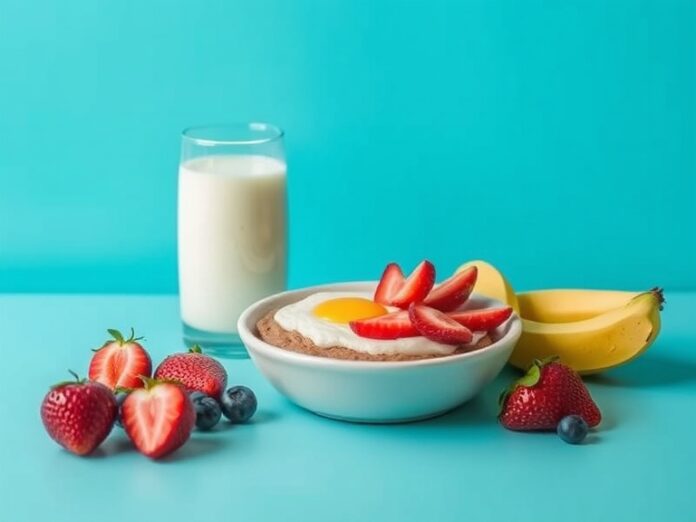Part 1: The Crucial Role of Breakfast in Weight Loss
Why is Breakfast So Important?
Breakfast is often called the most important meal of the day, and for good reason. It sets the tone for your metabolism, energy levels, and eating habits throughout the day. Research shows that eating a healthy breakfast can significantly contribute to weight management and overall health.
- Boosts Metabolism and Enhances Calorie Burning
Eating breakfast kick-starts your metabolism, helping your body burn calories more efficiently. A study published in The American Journal of Clinical Nutrition found that individuals who regularly eat breakfast have higher resting energy expenditure compared to those who skip it. - Controls Hunger and Reduces Overeating
Starting the day with a nutritious meal helps control hunger hormones, such as ghrelin, preventing cravings and binge eating later in the day. For example, research conducted by the University of Missouri showed that high-protein breakfasts reduce hunger and snacking throughout the day. - Provides Energy for Daily Activities
Breakfast fuels your body after an overnight fast, giving you the energy needed for physical and mental tasks. Skipping it may leave you feeling sluggish and impair your productivity.
Consequences of Skipping Breakfast
- Increased Appetite and Risk of Weight Gain
Skipping breakfast often leads to overeating during subsequent meals. A study in Obesity revealed that breakfast skippers are more likely to consume high-calorie snacks, leading to weight gain. - Reduced Energy and Performance
Without breakfast, energy levels drop, and cognitive performance declines, particularly in tasks requiring focus and memory. - Negative Effects on Overall Health
Chronic skipping of breakfast is linked to a higher risk of metabolic disorders, including diabetes and cardiovascular disease.
Part 2: Principles for Building an Effective Weight-Loss Breakfast

Building an effective weight-loss breakfast is a crucial step in setting the tone for a successful day. To craft a nutritious morning meal, certain principles should guide your choices.
Key Nutritional Components
- Protein
Foods like eggs, Greek yogurt, chicken breast, and fish keep you full longer and help preserve muscle mass during weight loss.- Example: A study in The Journal of Nutrition found that high-protein breakfasts significantly reduce daily calorie intake.
- Fiber
Whole grains, oatmeal, fruits, and vegetables support digestion and prolong satiety.- Example: Oats with berries offer a fiber-packed meal that regulates blood sugar levels.
- Healthy Fats
Sources like olive oil, avocado, and nuts provide essential fatty acids and keep you feeling satisfied. - Limited Sugars and Refined Carbs
Avoid sugary pastries and processed cereals, which cause blood sugar spikes followed by crashes.
Portion Sizes and Customization
- Use your palm or a measuring cup to estimate portions.
- Adjust the serving sizes based on activity level and dietary needs.
Timing
- Eat breakfast within an hour of waking up to maximize its benefits.
- Early breakfasts align better with the body’s natural circadian rhythms, enhancing digestion and metabolism.
First, emphasize protein. High-protein foods, such as eggs, Greek yogurt, or cottage cheese, help increase satiety and promote muscle preservation, keeping you fuller for longer and reducing cravings later in the day.
Next, include healthy fats. Foods like avocados, nuts, or seeds not only enhance flavor but also contribute to sustained energy levels and support overall health.
Incorporate fiber-rich carbohydrates as well. Whole grains, fruits, and vegetables provide essential vitamins, minerals, and antioxidants, while their high fiber content aids digestion and contributes to a feeling of fullness.
Portion control is equally important. Pay attention to serving sizes to avoid excessive calorie intake. Mindful eating, where you savor each bite, can also enhance satisfaction and prevent overeating.
Lastly, balance is key. Strive for a well-rounded meal that includes a good mix of protein, healthy fats, and carbohydrates. This not only fuels your body for the day ahead but also fosters a healthy relationship with food.
Part 3: Diverse and Delicious Weight-Loss Breakfast Ideas

Starting your day with a nutritious breakfast is a powerful way to kick off your weight-loss journey. Here are some diverse and delicious ideas that not only satisfy your taste buds but also keep you on track with your goals.
Overnight Oats: Begin with rolled oats soaked overnight in almond milk or yogurt. Add toppings like fresh berries, a sprinkle of cinnamon, and a drizzle of honey. This meal is fiber-rich and keeps you full well into the morning.
Veggie Omelet: Whip up a fluffy omelet packed with colorful vegetables like bell peppers, spinach, and tomatoes. Pair it with a side of sliced avocado for healthy fats that enhance satiety.
Smoothie Bowl: Blend your favorite greens, a banana, and a scoop of protein powder with a splash of almond milk. Pour it into a bowl and top with granola, chia seeds, and fresh fruit. This vibrant dish is as visually appealing as it is nourishing.
Quinoa Porridge: Cook quinoa in almond milk with a pinch of salt and a dash of vanilla extract. Top it with slices of banana, walnuts, and a sprinkle of nutmeg for a warm and filling breakfast that’s also gluten-free.
Chia Seed Pudding: Combine chia seeds with coconut milk and a touch of maple syrup, letting it sit overnight. In the morning, add diced mango or berries for a refreshing and nutrient-dense start.
Avocado Toast: Spread ripe avocado on whole-grain toast and top it with poached eggs, cherry tomatoes, or radishes. This wholesome option is packed with fiber and healthy fats, helping you stay energized throughout the day.
Nutritious Breakfast Suggestions
- Oatmeal with Fruits and Nuts
Combine rolled oats with almond milk, top with bananas and walnuts. - Eggs with Vegetables
Try scrambled eggs with spinach, tomatoes, and a side of whole-grain toast. - Whole-Grain Bread with Cheese and Tomatoes
Pair multigrain toast with cottage cheese and fresh slices of tomato. - Greek Yogurt Parfait
Layer Greek yogurt with berries and chia seeds. - Green Smoothie
Blend spinach, kale, banana, and almond milk for a nutrient-dense drink.
Weekly Breakfast Plan
- Monday: Avocado toast with poached egg
- Tuesday: Overnight oats with almond butter
- Wednesday: Veggie omelet with whole-grain toast
- Thursday: Smoothie bowl with granola
- Friday: Greek yogurt with honey and mixed fruits
- Saturday: Quinoa breakfast bowl
- Sunday: Whole-wheat pancakes with berries
Part 4: Tips for Eating Breakfast to Aid Weight Loss

Eating breakfast can be a pivotal component of a successful weight loss journey. By starting your day with the right nutrients and portions, you set a positive tone for your eating habits throughout the day. Here are some thoughtful tips to help you make breakfast a powerful ally in your weight loss efforts.
1. Prioritize Protein: Incorporating a source of protein into your breakfast can help keep you feeling full and satisfied longer. Protein-rich foods such as eggs, Greek yogurt, cottage cheese, or nut butter can reduce cravings and prevent excessive snacking later in the day.
2. Choose Whole Grains: Opt for whole grains instead of refined carbohydrates. Whole-grain options like oats, quinoa, or whole-grain bread provide more fiber and nutrients, which can aid digestion and promote a feeling of fullness. They also help maintain stable blood sugar levels, preventing energy crashes that can lead to unhealthy food choices.
3. Load Up on Fruits and Vegetables: Including fruits and vegetables in your breakfast is an excellent way to boost your fiber intake and add essential vitamins and minerals. Consider adding spinach to an omelet, topping your oatmeal with berries, or blending a green smoothie. Their natural sweetness can also satisfy morning sugar cravings, providing a healthier start.
4. Watch Portion Sizes: It’s easy to overindulge during breakfast, especially with popular items like pancakes or pastries. Pay attention to portion sizes to ensure you’re consuming food mindfully. Try using smaller plates or bowls, and remember that moderation is key. Savor each bite to enhance your eating experience.
5. Plan Ahead: Preparing breakfast the night before can eliminate morning chaos and help you make healthier choices. Overnight oats or pre-made smoothies can save you time and keep you from reaching for quick, unhealthy options out of convenience. Meal prepping ensures that you have nutritious, weight-loss-friendly breakfast options readily available.
6. Be Mindful of Beverages: High-calorie coffee drinks, sugary juices, or sodas can add unnecessary calories to your breakfast. Choose water, herbal tea, or black coffee instead. If you enjoy smoothies, blend them with low-calorie ingredients such as unsweetened almond milk, leafy greens, or protein powder to keep calories in check.
7. Stay Consistent: Skipping breakfast can lead to increased hunger later in the day, often resulting in greater calorie consumption. Aim for consistency by having breakfast every day, even if your schedule is hectic. This routine helps regulate your body’s hunger signals and sets a positive tone for your meals throughout the day.
8. Listen to Your Body: Pay attention to how different foods make you feel. Some may give you sustained energy, while others may leave you sluggish or craving more. Adjust your breakfast choices based on your body’s responses to find what works best for you.
Stay Hydrated
- Drink water before and after breakfast to support digestion and metabolism.
- Proper hydration aids fat breakdown and reduces calorie consumption from liquid calories.
Balance Breakfast with Lifestyle
- Breakfast alone won’t cause weight loss—combine it with regular exercise and balanced meals throughout the day.
Avoid Common Pitfalls
- Overloading on Carbs
Replace sugary cereals with whole grains. - Skipping Breakfast
Leads to irregular eating patterns and cravings. - Relying on Fruit Juices
Opt for whole fruits instead of calorie-dense juices.
Part 5: Frequently Asked Questions

1. Why is breakfast important for weight loss?
Breakfast plays a crucial role in weight loss by jump-starting your metabolism and providing essential nutrients after a night of fasting. A balanced breakfast can help regulate blood sugar levels, reduce cravings later in the day, and promote a healthier overall eating pattern.
2. What types of foods should I include in a healthy breakfast?
To create a weight-loss-friendly breakfast, focus on a combination of protein, healthy fats, and complex carbohydrates. Examples include oatmeal topped with nuts and fruits, Greek yogurt with berries, or a smoothie with spinach, banana, and protein powder. These foods can help keep you fuller for longer and reduce the likelihood of unhealthy snacking.
3. How can I ensure my breakfast is balanced?
A balanced breakfast typically includes a source of protein (such as eggs, yogurt, or nut butter), healthy fats (like avocado or nuts), and fiber-rich carbohydrates (such as whole grains, fruits, or vegetables). By incorporating these components, you can create a meal that supports satiety and energy levels.
4. Is it okay to skip breakfast for weight loss?
While some people find success with intermittent fasting, skipping breakfast may not be suitable for everyone. For many, eating a nutritious breakfast can prevent overeating later in the day and provide the energy needed to stay active. It’s important to find what works best for your body and lifestyle.
5. How does breakfast affect my metabolism?
Eating breakfast can help boost your metabolism by signaling to your body that it’s time to start burning calories. When you eat a meal in the morning, it stimulates thermogenesis, the process through which your body generates heat and energy, ultimately leading to more calories burned.
6. Should I consider portion sizes for breakfast?
Yes, portion sizes are important for weight management. Even healthy foods can contribute to weight gain if consumed in excessive amounts. Pay attention to serving sizes, listen to your hunger cues, and aim for moderation to create a calorie deficit conducive to weight loss.
7. How can I make breakfast more enjoyable and sustainable?
Experiment with different recipes and flavors to find breakfasts you enjoy. Try incorporating seasonal fruits, various spices, or different cooking methods. Meal prepping can also help, allowing you to have delicious, nutritious breakfasts ready to go, reducing stress and decision fatigue in the morning.
8. Can I eat the same breakfast every day?
While it’s generally okay to have a go-to breakfast, variety is beneficial for nutritional balance and preventing dietary boredom. Different foods provide different nutrients, so mixing it up can help you meet your nutritional needs more effectively and keep you motivated.
9. How much time should I spend on breakfast?
Ideally, you should spend around 15-30 minutes preparing and enjoying your breakfast. However, if you’re pressed for time, consider quick options like overnight oats or smoothies that can be made in advance. The key is to prioritize breakfast in your morning routine.
10. What should I do if I don’t feel hungry in the morning?
It’s common for some people to have little appetite in the morning. If this is the case for you, start with smaller portions or lighter options like a piece of fruit or a smoothie. Gradually introducing food into your morning routine can help reset your hunger cues over time.
11. Does Late Breakfast Impact Weight Loss?
Yes, eating breakfast late can disrupt metabolism and increase the likelihood of overeating during the day.
12. Can Breakfast Be Just Fruits?
While fruits are healthy, a balanced breakfast including protein and fats is more effective in controlling hunger and maintaining energy.
13. What Should Gym Enthusiasts Eat for Breakfast?
High-protein, moderate-carb meals are ideal. Examples include scrambled eggs with sweet potato or a smoothie with whey protein.



